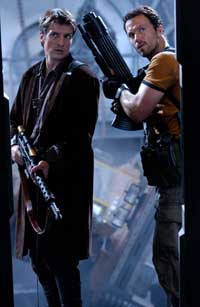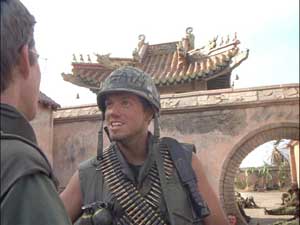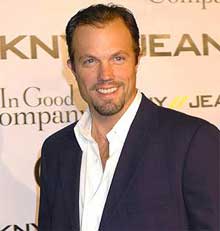 Adam Baldwin had just watched the Jaynestown episode of Firefly the night before the Serenity junket in LA. I can understand why you would want to watch an episode of a TV show where someone has built a statue of you. Jaynestown is probably one of the three best episodes of that short lived series, partially because it focuses so much on one of the show’s best characters.
Adam Baldwin had just watched the Jaynestown episode of Firefly the night before the Serenity junket in LA. I can understand why you would want to watch an episode of a TV show where someone has built a statue of you. Jaynestown is probably one of the three best episodes of that short lived series, partially because it focuses so much on one of the show’s best characters.
Baldwin’s long been a CHUD favorite actor, so we were very happy when he joined that show (and later, briefly, Angel), and that also means that when Universal asked me who I wanted to have one on one interviews with, Adam Baldwin’s name was on that list.
We sat down to talk after his panel press conference (which you can read by clicking here). Baldwin’s a thoughtful guy, often taking a little time to compose his sentences before speaking. He’s big as hell, too. Really damn intimidating – but also, weirdly, coming across as very gentle. I got the impression he would feel really badly if I had forced him into a Dreyfuss-like punching.
By the way, we’re at the tail end of our Serenity coverage – all that’s left is Joss’ press conference,which is much more Serenity oriented than our wide ranging one on one. If you want to catch up on the coverage, here it is:
Joss Whedon One on One
Part 1
Part 2
Nathan Fillion, Gina Torres, Morena Baccarin Press Conference
Adam Baldwin, Summer Glau, Sean Maher, Jewel Staite Press Conference
 Q: One of the things that I love about you in Firefly and Serenity is that Joss saw the comedian in you. That’s not something we see in a lot of other Adam Baldwin roles. Is that something you’ve been itching to get at, or something you discovered?
Q: One of the things that I love about you in Firefly and Serenity is that Joss saw the comedian in you. That’s not something we see in a lot of other Adam Baldwin roles. Is that something you’ve been itching to get at, or something you discovered?
Baldwin: He gave me a lot of license and freedom to play around with that gruff exterior. Also, another important element for me was that this was very much in my wheelhouse, as far as action/adventure and westerny things. Growing up I was a fan of those. The roots of my movie going experiences when I was a kid was going to those shoot em ups, as my dad called them. The Wild Bunch, the Good the Bad and the Ugly. Guys like Eli Wallach, Warren Oates, Jason Robards – this character of Jayne was very much in keeping with [growly Jayne voice] that kind of individual, stab you in the back if the money’s right kind of thing. [back to normal!]
When you get freed up like that you can overplay the beats to the point where it’s too much. My job was to bring too much to the role and Joss would bring it back – ‘OK, Adam, bring it back!’ I’m lucky that he was able to tap into that sort of sarcastic, rye, play dumb type humor that I was inspired by when I was younger.
Q: I’m always curious about Jayne – we’ve seen how he joined the crew, and we saw why Mal sort of trusts him in that one episode after he betrays the crew. But why does Jayne stick with the crew? The money’s not that great, and it’s kind of a pain in the ass all the time with River.
Baldwin: Well I see Jayne as sort of a black sheep of maybe even a middle class family who just got bored with his middle class life and was looking for adventure on the frontier. He escaped from whatever they may have been with no animosity towards his family but as a way of escaping, seeing what’s out there. It’s just his sorta way of going to college; the school of hard knocks. He’s a carpetbagger and whatever better offer comes along…
But when he does finally meet Mal and Zoe in that episode Out Of Gas, he’s finally at that point of, ‘Enough of this! I want a little more creature comforts in life!’ But I think he’s truly inspired by the way Mal is able to hold together this crew – this family, this dysfunctional family. He really does feel a loyalty.
And when you say that he betrayed the crew, he didn’t really betray the crew. He thought he was doing the right thing by getting rid of the very reason that the Alliance was going to rain destruction down upon them. They were having a pretty easy time until they brought along these fugitives from the Alliance. He miscalculated, and I think he was able to redeem himself with Mal because Mal realized he wasn’t doing it with malice.
Q: At the end of the film, things go in a political direction, where Mal is obsessed with revealing the truth you guys discover. Jayne gets in on it, but how political do you think Jayne gets there? How much of it is that he really cares and how much of it is, ‘Well I’ve been on the ride this long…’?
Baldwin: He says, ‘If you can’t do something smart, do something right.’ I think that’s true. In my own personal life I think it’s more important to do something right than it is to do something smart, because smart is subjective. I guess right can be as well, so there is a confusing choice that he has to make. But obviously the politics that I see in this film – I don’t want to get into any heavy handed thing – it’s obvious that totalitarianism is the biggest threat to societies around the world, and humankind needs to stand up to and against those ideologies and forms of government. The choice is tyranny and subjugation and slavery, really. At the point, the verse, quote unquote, is going to come crashing down unless they reveal this secret, so Jayne is forced to go along with this decision. I don’t know if I could say it any better.
could say it any better.
Q: You have had this incredible career. You started with My Bodyguard, where you were picked out of a crowd of 4000. What were your motivations to be an actor, what made you want to go to that audition in the first place?
Baldwin: I had been in drama class since fifth grade, it was just something I did for fun. The schools I went to had drama classes and then the high school I went to had a nice performing arts department. So I was lucky in that that was an outlet for any emotional angst I had as a teenager. I come from a broken home. I was able to find friends and to study at the high school level as best I could some forms of literature I wouldn’t have otherwise been exposed to. That was a great outlet for me.
My Bodyguard just came along as really a lark. The production company of My Bodyguard came to Chicago – as well as Dallas and Toronto and New York and LA. They weren’t sure where they were going to shoot the film and they decided on Chicago ultimately, but I guess when I walked into that room I was that screwed up kid that they were looking for. I happened to be in the right place at the right time. Fortunately I had good people in charge – Don Bill, Tony Devlin and Dean Devlin – who were able to look out for me and were able to nurture me.
After that I did a small part in Ordinary People, we shot that in the fall of 79, the same time period. Beyond that I had to go and actually learn how to become an actor. To learn what it means to be a film actor and a TV actor. Which is a different animal from a stage actor; I think it’s clear that there are different techniques involved. I’m fortunate that 26 years later I’m still here, I’m still in the game. I feel blessed that I have had three signature roles that people know me for and recognize. They say, ‘Ah, you’re the guy from My Bodyguard, Linderman!’ Or ‘Hey, Full Metal Jacket! Animal Mother!’ And now Jayne Cobb from Firefly and Serenity. I’m just lucky and blessed, and I’m trying to get better at what I do. The older you get the wiser you get, and the more comfortable you can be in your skin the better you can be.
Q: Speaking of Full Metal Jacket, how did that happen? Did you audition, did they see you someplace? Baldwin: I did put a scene on videotape that was sent to Stanley Kubrick. I don’t know if he did watch it or not – I don’t think he watched mine. I think he had already seen My Bodyguard. He watched voraciously everything that came out that he could get his hands on, and he had seen that. Later on in the production I asked, ‘Did you ever watch my tape?’ and he said, ‘I think maybe I did, but you were that guy in My Bodyguard with the army coat on and I thought you’d make a good Animal Mother.’ OK, great! Thanks, here I am!
Baldwin: I did put a scene on videotape that was sent to Stanley Kubrick. I don’t know if he did watch it or not – I don’t think he watched mine. I think he had already seen My Bodyguard. He watched voraciously everything that came out that he could get his hands on, and he had seen that. Later on in the production I asked, ‘Did you ever watch my tape?’ and he said, ‘I think maybe I did, but you were that guy in My Bodyguard with the army coat on and I thought you’d make a good Animal Mother.’ OK, great! Thanks, here I am!
Q: What was he like? What was that experience like?
Baldwin: Kubrick… Grandmaster. Manipulator. Puppeteer of this little army that he had. He was a great general. Kind yet at moments he could be tyrannical. Brilliant, yet he was a lousy actor. He would have been the first to admit it – and he did. ‘Forget the acting,’ he would say when he was trying to interpret a scene for you.
You would say, ‘What does that mean – faster, louder, slower?’ He would not really be that comfortable expressing the give and take in the scenes. I was 23 and I wish – there are two things I regret about that. One is being so young and not able to appreciate what it was that I was a part of, and two, not having the communication skills at that time to have made it easier to form a synergy between what he wanted from us and what we were able to deliver. I mean, I’m happy with the outcome and we got to do lots and lots of takes.
But still, ‘Great, what do you mean by slower? Just give me a fucking line reading!’ And then he would say, ‘Well here’s the line, but forget the acting.’ He would give me the line reading and say, ‘Don’t act it that way! It’s just the rhythm I want.’
He was a kind gentleman, a brilliant man, very well read. He could do everything. He could organize, great photographer. One thing he couldn’t do was act.
Q: It seems to me that Joss Whedon would be completely different when it comes to dealing with actors. What’s his style?
Baldwin: Joss is very hands on, and yet he’ll set it in place and let you play. If he sees you coming up to a moment where there’s a blockage, he’ll be right there to say, ‘Try this, try that.’
that.’
My school of acting is pretty much – what works for me is to see two actors on screen struggling to win. Some people say, ‘What’s my motivation?’ some people call it other things. I’m of the school that simplifies it – what do I need to do to win this beat? How do I get the other actor to do and to do for me so that I can become victorious playing this beat? If you have two skilled actors who are both trying to win, who one ups each other, it’s that struggle on camera or on stage that, to me, is dynamic and interesting. That was what I was always trying to play – how do I win this frame? If I’m in this frame, how do I win it so everyone is looking at me? More often than not, Joss would say, ‘Adam, that’s too much and too distracting from what I’m really trying to do, you’re just in the background.’ So I would bring it down.
But I would always try to find little doings, try to be busy when I’m in the background. Play the positive. Joss was very strong, he understood that very clearly, and he would provide the tools with which you could achieve that. He would do that in different ways with different actors. With me it more of a shorthand. With others they would have different communication skills and processes that they would need to go through in order to achieve basically the same results – you want to win. It’s a question of how he relates. So he’s very adaptive to each individual, and that’s a testament to his brilliance.
Q: You have this long career and you’re working with an ensemble cast that is made up of a couple of less experienced actors. How do you approach that – do you come as a mentor to Summer or Jewel? How does that work?
Baldwin: It’s not by any overt means that I would step up and say, ‘I’m the leader,’ because I don’t consider myself the leader at all. Joss is the leader and Nathan is the captain. I’m just part of the cast and I bring my own personality to it. I think everyone has their own strengths that they bring to the show, to the synergy. The camaraderie that we’re bringing forth for the promotion of the film. I am older, but I look up to Ron Glass whenever I’m around him because he’s certainly wiser than I am. In some things. And in some things not so much! [laughs] But no.
We just have a good time. The thing is that what makes it so easy to go out and talk about Serenity and Firefly is that we love it. We love the show, we love our characters, we love Joss, and we’ve been treated extremely well by Universal Studios and we just have everlasting gratitude that we’re able to be redeemed in this way. We hope for the best with the film, and come what may, we have closure. We’re not just hung out there as a failed TV show. This was an important story to us. Hopefully it will become a very important story for many people.